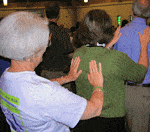Dr. Rodger Nishioka: What are young adults seeking and how do we respond?

Dr. Rodger Nishioka returned to the speaker’s podium in the afternoon for the second part of his presentation: “What are young adults seeking and how do we respond?”
He had participants stand up and massage the back of the person to their sides as a way to combat the typical post-lunch tendency to fall asleep and nap.
The call for us today, he said, is a task of discernment, even though, as The Rev. Michael Cooper-White, president of Gettysburg Seminary reminded the assembly in his greetings before Dr. Nishioka’s presentation, the Church is Jesus Christ’s, and God will carry all of us through these times of transition.
Dr. Nishioka spoke about Phyllis Tickle’s theory that the church renews itself every 500 years or so. Tickle says it is time for a “rummage sale” again in our day. We are living in challenging times, and we won’t know what these times of renewal will be called, just as those living in the days of the Reformation did not know it was going to be a great historical era.
Dr. Nishioka said young adults are seeking three things:
1. Quality, authentic relationships
2. Ethical vitality and integrity
3. Theological vitality and integrity
He continued, saying he was wary of being formulaic, with these bullet points in his PowerPoint presentation:
• Intentional, sustained prayer prepares a congregation to receive young adults
• Meeting in homes is most attractive
• Building relationships is key
• Intentional, consistent, immediate communication (Facebook, Twitter, texting)
• Shared meals
• Focus on the Bible
Dr. Nishioka illustrated each of these points with real-life examples, many of which were what Presbyterian congregations have done, all with his characteristic humor.
Other practices:
• Focus on narrative theology (tell a story)
• Passion is consistently related to vitality
• Authenticity is consistently related to integrity
• Experience means engaging more than one sense (Suggestion: Have bread baking in the oven for people to smell when they come for worship. Smell is so closely linked with memory.)
• Wonder, awe and mystery are compelling (For many young adults, these come best in music – such as Taize music.)
Modeling some of his suggested practices, Dr. Nishioka had the assembly singing “Jesus, Remember Me” to experience – just for a moment – the wonder, awe and mystery of God (and spontaneity). At another moment, he told a compelling story of a congregation’s hospitality to a couple living in Iowa in which the woman had been diagnosed with breast cancer. He had the assembly paying rapt attention as he told the story (illustrating the telling of a story to convey a point).
Dr. Nishioka said he is not worried about the future of the church. He said he is “grateful for you [leaders of the church].” In conclusion, he wished the assembly the courage and wisdom to respond to the Spirit’s call to reach out to young adults.



